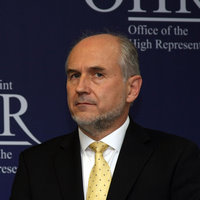This past spring, the international community put discussions about the future of Bosnia, a country crippled by institutional dysfunction, on ice until after the upcoming elections on Oct. 3. But even should the election's winners have the will to address the gridlock that blocks effective governance, they will not have the power. The best that can be hoped for is that the country's profound political frustrations continue to be expressed peacefully.
The internationally brokered Dayton Accords brought an end to the Bosnian civil war in 1995 and subsequently safeguarded the political prerogatives of the country's Serb and Croat minorities in the face of an overwhelming Bosniak (Muslim) plurality that represents 48 percent of the population. But to do so, the accord left the country split into two equally sized "entities": the highly centralized, Serb-dominated Republika Srpska, and a sprawling patchwork of local administrations that make up the Federation, shared by Bosniaks and Croats. And that, along with the accord's other power-sharing provisions, has made it all but impossible to govern.
Each of the Federation's 10 cantons has its own parliament, leaving the country of 4 million inhabitants with a total of 14. None of them can pass a law without the approval of all three ethnic groups. In practical terms, that means that the disapproval by a simple majority of Croats, or just 7 percent of the electorate, is enough to derail the passage of a law. As a result, precious little lawmaking takes place. As for the presidency, which is also up for grabs in this election, it, too, consists of a representative of each of the three main ethnic groups, with the chairmanship rotating every eight months.

